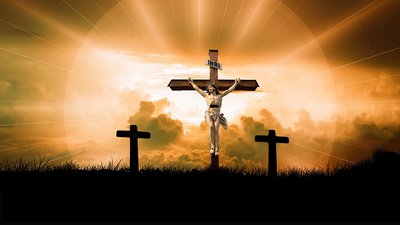Thoughts for the Day
Saturday, 31st August 2024: The cross a stumbling block and foolishness
Paul 1 Corinthians 1 Wisdom Corinth Law of Moses Cross
Reading : Verses from 1 Corinthians, Chapter 1

Paul, called to be an apostle of Christ Jesus by the will of God, and our brother Sosthenes: To the church of God that is in Corinth, to those who are sanctified in Christ Jesus, called to be saints, together with all those who in every place call on the name of our Lord Jesus Christ, both their Lord and ours: Grace to you and peace from God our Father and the Lord Jesus Christ....
Now I appeal to you, brothers and sisters, by the name of our Lord Jesus Christ, that all of you should be in agreement and that there should be no divisions among you, but that you should be united in the same mind and the same purpose. For it has been reported to me by Chloe’s people that there are quarrels among you, my brothers and sisters....
For the message about the cross is foolishness to those who are perishing, but to us who are being saved it is the power of God. For it is written, ‘I will destroy the wisdom of the wise, and the discernment of the discerning I will thwart.’ Where is the one who is wise? Where is the scribe? Where is the debater of this age? Has not God made foolish the wisdom of the world? For Jews demand signs and Greeks desire wisdom, but we proclaim Christ crucified, a stumbling-block to Jews and foolishness to Gentiles, but to those who are the called, both Jews and Greeks, Christ is the power of God and the wisdom of God.
Consider your own call, brothers and sisters: not many of you were wise by human standards, not many were powerful, not many were of noble birth. But God chose what is foolish in the world to shame the wise; God chose what is weak in the world to shame the strong; God chose what is low and despised in the world so that no one might boast in the presence of God. He is the source of your life in Christ Jesus, who became for us wisdom from God, and righteousness and sanctification and redemption, in order that, as it is written, ‘Let the one who boasts, boast in the Lord.’
(Lectionary, New Revised Standard Version)
Thoughts
The Apostle Paul had a close tie to the city of Corinth having established the church in this prosperous port city. Now he writes to them from Ephesus where he has received news that there have been problems in the congregation. Notice the particular way Paul starts the letter - 'To the church of God, that is in Corinth'. We might wonder when we hear more of the christians here if the spirit of the city has influenced the church rather than the church influencing the city. We are often told today that the church needs to keep up with the times, but I want to argue, that above all, in this unhappy age it needs to be faithful to the message of Jesus Christ.
Paul addresses his arguments to the members of the church, and although he has been brought up as a scholar ('at the feet of Gamaliel') and as a Pharisee accustomed to obeying every aspect of the Law of Moses, he speaks to them in ordinary language. He emphasises the fact that this Jesus whom they worship was crucified as a condemned criminal, despite being the Son of God, and that those who would be saved should confess their sin and believe in him.
Many Jews despised this notion of such a Saviour How could a condemned man who had frequently broken the law be their Saviour? It was a huge stumbling block for Jews brought up to revere the Law of Moses. On the other hand to the Greeks in this mixed community, the whole idea was completely foolish. For them God was some superior God of wisdom, how could they believe in a God who could not save himself? His plan concerning the cross was seen as ridiculous. The gentiles' dependance on wisdom was a mistake, for wisdom might bring happiness in this world but it cannot save the soul. We may ask ourselves if this is why so many otherwise intelligent people turn away from Christianity today?
The Evangelist Charles Spurgeon once said:
- “It is certain that a blind man is no judge of colours, a deaf man is no judge of sound, and a man who has never been quickened into spiritual life can have no judgment as to spiritual things."
Prayer
Lord Jesus Christ,
when others think we are foolish
because we believe in You as our Saviour,
may we continue to stand firm in the truth
of our conviction.
Help us to recognise this truth
as seen in our life,
and may we continue to grow
closer and closer to You.
Amen.
If you want to know more about Corinth at this time. This article from 'Early Church History' might be of interest:
Or about Paul's teacher Gamaliel: